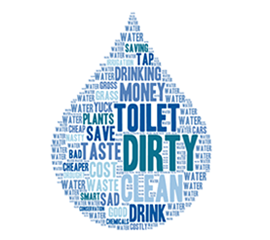16 Aug 11 Outreach Strategies for Potable Reuse
 In general, the public’s perception about recycled drinking water can be summed up in a few (and sometimes negative) catch-phrases. Here’s what we’ve learned over the years to begin to turn-around these perceptions:
In general, the public’s perception about recycled drinking water can be summed up in a few (and sometimes negative) catch-phrases. Here’s what we’ve learned over the years to begin to turn-around these perceptions:
- Start with research: Who are your audiences? What do they think? What do they understand?
- Get the language right: Do not assume your audiences know anything about potable water or how their water supply is maintained for their benefit.
- Talk tech, but do it briefly and simply: Photographs, graphics, and simplified descriptions have been proved to aide communication success.
- Build alliances: A coalition of supporters can create a powerful bandwagon that can attract members of their own circles of influence.
- Query your team’s attitudes: When identifying stakeholders and audiences, make sure your own employees are at the top of the list. Find out what they think or what they need to know.
- Promote two-way communication but manage expectations: Invite input where it can be used, but set realistic expectations for how input will be incorporated.
- Develop a message platform: The ultimate message goal is for people to see potable reuse as an acceptable alternative because they have been well informed in a transparent way.
- Use graphics and videos: Given the complexity of reuse projects, clear graphics will be tremendously valuable in helping customers visualize a project and understand technical aspects.
- Establish a news bureau: Get ready for media relations and develop a rapid response plan to address misinformation or misunderstanding.
- Use social media judiciously: It can be helpful, and can be dangerous. Understand it’s power and be strategic.
- Touring is believing: Solid graphics are great; hands on experiences are even more powerful. Where demonstration or touring is possible – make plans early.
